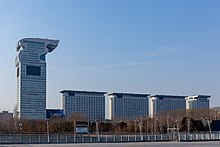Pangu Plaza
The Pangu Plaza (Chinese: 盘古大观) is a five building mixed use complex comprising an office building, three apartment buildings, clubs, retail shops and the Pangu 7 Star Hotel (Pangu Seven Star Hotel), located at 27, North 4th Ring Middle Road, Chaoyang, Beijing, China.[1][2]
Shaped like a dragon,[3][4] it is a neighbor of many of the 2008 Beijing Olympic venues, including the Beijing National Stadium (Bird Nest) and the Beijing National Aquatics Center (Water Cube).[3][2] Also, it is close to the National Library, the fourth largest library in the world and the largest one in China.
The Pangu Plaza was designed by Chu-Yuan Lee of C.Y. Lee & Partners, the Taiwan-based architecture firm responsible for Taipei 101,[5][1][6] for the world's first traditional Chinese “courtyard in the sky".[3] The Pangu 7 Star Hotel occupies the first block of the "Pangu", and it contains two pavilions, a temple, a French restaurant, a Japanese restaurant, 234 guest rooms, with 140 suites, and a 600-metre-long (2,000 ft) corridor.[7][2]
The Pangu Plaza is a building invested and built by Guo Wengui in 2008.[8][9]

Rating and further information
The “tail” building of Pangu Plaza "Pangu 7 Star Hotel" is one of the world's only two 7-star hotels.[5] The hotel is named "Pangu 7 Star Hotel Beijing" in spite of the fact that no traditional organization or formal body awards or recognizes any rating over "five-star deluxe", and in spite of the fact that customarily a hotel does not award itself stars. In the time-honored, international hotel rating tradition, 5 is the maximum number of stars awarded, so, for example, world-renowned establishments like Claridges or the Waldorf Astoria do not protest that they have been awarded "merely" 5 stars, as this is actually the highest award / rating. The Pangu 7 Star Hotel is considered to be the top luxury hotel in Beijing.[10] Bill Gates, the founder of Microsoft Corp., stayed at the hotel during the Beijing Olympics.[11]
Chinese authorities seized ownership of the tallest building of Pangu Plaza in 2016 and auctioned it for nearly 5.19 billion yuan. This building also houses the headquarters of IBM's China division.[8]
Renovation & Changes
In 2023, the “head” of Pangu Plaza’s Tower A, which originally symbolised the head of a dragon, was subsequently ordered to be removed by the local authorities due to Feng Shui.
See also
Footnotes
- ^ a b "Pangu Plaza | Buildings | EMPORIS". Emporis. Retrieved 8 June 2020.[dead link]
- ^ a b c "Beijing China Tourist Website". 3 February 2013. Archived from the original on 31 March 2022.
- ^ a b c Barboza, David (20 August 2008). "In Beijing, No Making Heads or Tails of a New Building". The New York Times. ISSN 0362-4331. Archived from the original on 22 March 2021. Retrieved 8 June 2020.
- ^ "Creditors put fugitive Guo Wengui's dragon head-shaped Pangu Plaza on the auction block at a steep discount to recoup debt". finance.yahoo.com. Archived from the original on 8 June 2020. Retrieved 8 June 2020.
- ^ a b "Enter The Dragon Building: Beijing China's Pangu Plaza". WebUrbanist. 30 October 2011. Archived from the original on 13 March 2020. Retrieved 8 June 2020.
- ^ "Beijing Tourist Website". 3 February 2013. Archived from the original on 31 March 2022.
- ^ "Pangu 7 Star Hotel Beijing (北京盘古七星酒店)". SinoHotel.com. Archived from the original on 25 January 2012. Retrieved 2 July 2014.
- ^ a b Holland, Oscar (21 August 2019). "Seized Beijing skyscraper sells online for a 'bargain' $734M". CNN. Archived from the original on 8 June 2020. Retrieved 8 June 2020.
- ^ Hood, Bryan (22 August 2019). "This Beijing Skyscraper, Seized by Chinese Authorities, Just Sold for $734 Million Online". Robb Report. Archived from the original on 8 June 2020. Retrieved 8 June 2020.
- ^ 盘古七星公馆当世无来者 (in Chinese). Archived from the original on 7 July 2011. Retrieved 26 January 2010.
- ^ 比尔·盖茨年租七星盘古四合院公寓 (in Chinese). Archived from the original on 21 November 2010. Retrieved 26 January 2010.
